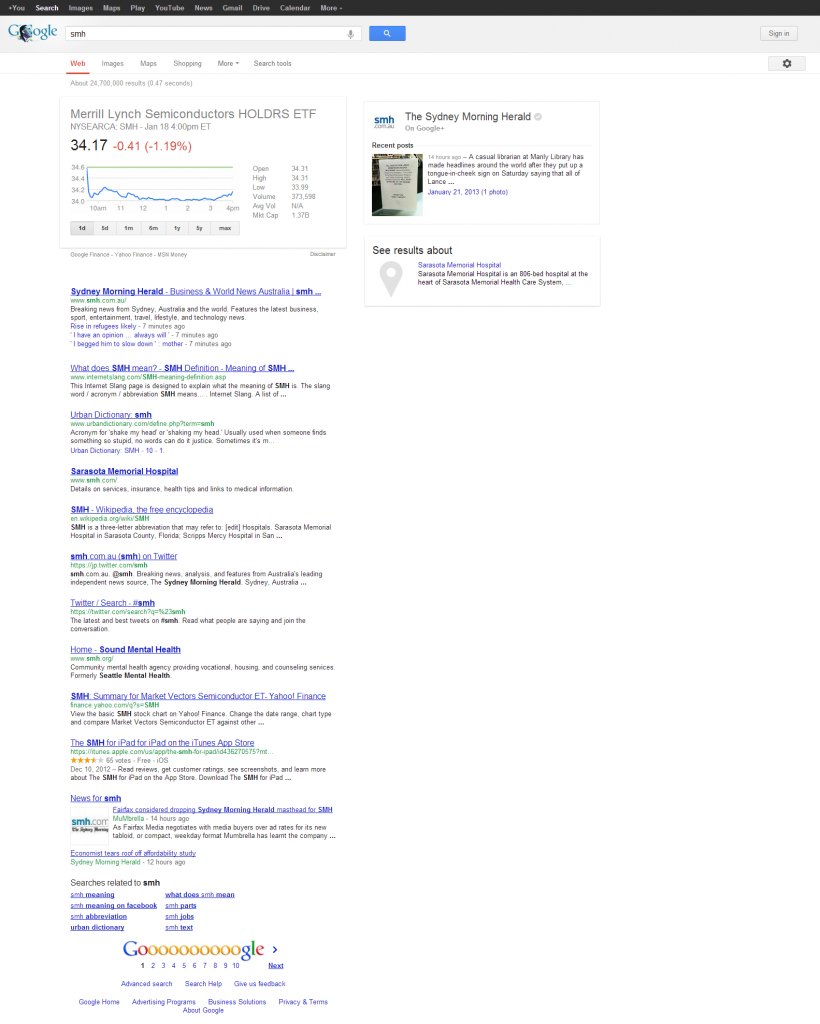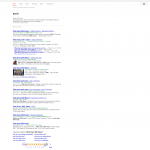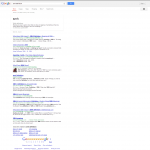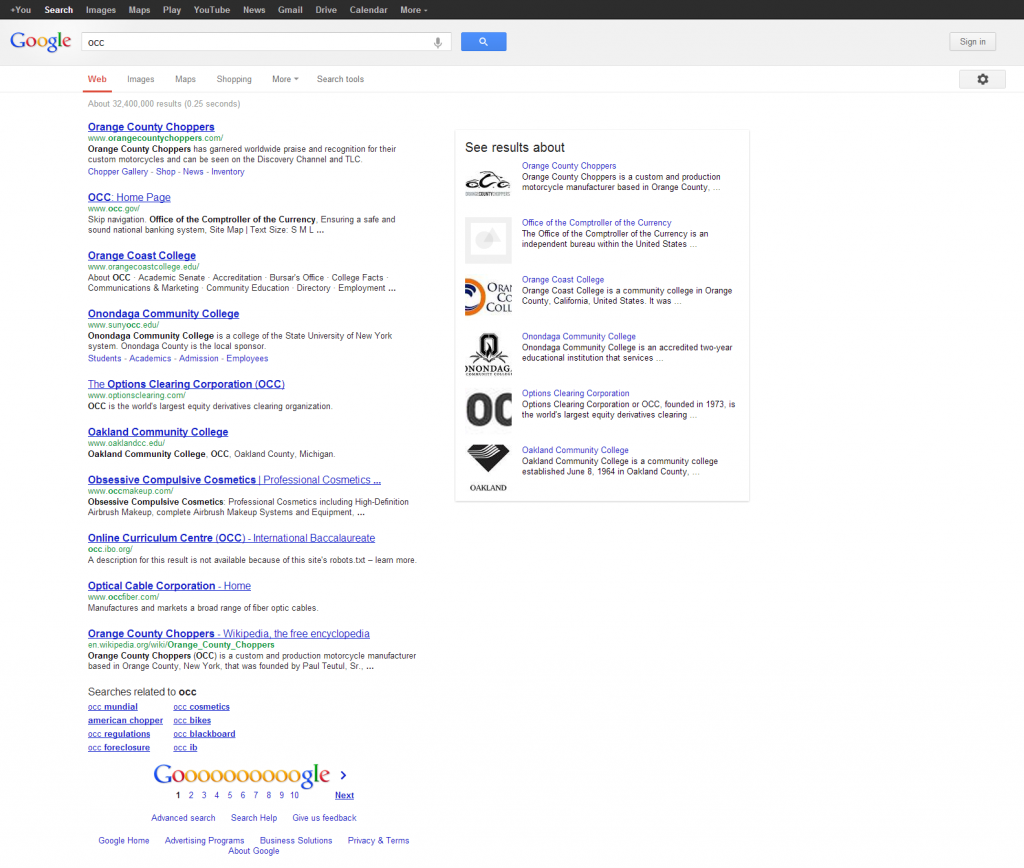Summary: These kids today and their abbreviations and acronyms, or in this case an initialism for "Shaking My Head". I've basically given up trying to keep up at this point, but that doesn't mean I don't want to know what these things mean when I see them. This curiosity brought me on a short journey into some interesting search results pages recently and today I thought I'd share a few observations with you. As they become more pervasive, it's going to be important to understand how you can harness the power of "intelligent search results" and use them to your advantage.
*SCROLL FOR UPDATES*
Before we get to the web definition of "SMH", allow me to first correct my own headline. SMH, is an
initialism and
NOT an acronym. Ever since I learned this distinction, I take every opportunity to educate others. Break it down
Grammar Girl:
Initialisms are another type of abbreviation. They are often confused with acronyms because they are made up of letters, so they look similar, but they can't be pronounced as words. FBI and CIA are examples of initialisms because they're made up of the first letters of FederalBureau of Investigation and Central Intelligence Agency, respectively, but they can't be pronounced as words. NASA, on the other hand, is an acronym because even though it is also made up of the first letters of the department name (National Aeronautics and Space Administration), it is pronounced as a word, NASA, and not by spelling out the letters N, A, S, A.
I'm leaving "acronym" in the headline because that's what most people believe is correct (and will search for), but I hope you've enjoyed your grammar lesson for the day.
SMH = Internet Speak for "Shake My Head"
Let me first say that I like to think that I do a good job of staying on top of what all the cool kids are doing on the internet, usually hearing about the latest memes and viral videos early in their cycles. It has, however, become increasingly clear that I'm quite out of the loop when it comes to internet shorthand - initialisms and acronyms that allow users to say more with fewer characters. I think most of us remember when "
LOL" began to gain popularity over a decade ago on
AOL Instant Messenger and other chat platforms. LMAO, ROFL and OMG were some of the other earliest, widely adopted internet initialisms to take root. But these days there are so many it can be tough to keep up. I'll admit that I only learned sometime last year that ICYMI is internet shorthand for "in case you missed it", and just a few months ago I found out that YOLO means "you only live once". But I haven't had one of those "you're old!" gut punches in at least a few weeks... until last week when
Honest Toddler tweeted this:
Now, I'm familiar enough with HT's work that I figured this wasn't just some inside joke I didn't get and it didn't make sense that "smh" would be someone's initials, in context. So I did what I always do when I don't know something - I Google it, and within seconds I had my answer. Via
Urban Dictionary:
Acronym for 'shake my head' or 'shaking my head.' Usually used when someone finds something so stupid, no words can do it justice. Sometimes it's modified to 'smfh' or 'smmfh' by those that prefer profanity in their internet acronyms.
So there you have it. SMH = shake/shaking my head. Now neither you or I will have to pretend to be hip enough to know what these millenials are talking about when we see SMH pop up in our Twitter feeds, Facebook comments or Skype IMs.
SMH Search Results
While finding out what SMH stands for took about 10 seconds, it's what I noticed along the way that really struck me - Google's search results for SMH. I always like to examine interesting first page search results whenever I run across them so we can all better understand the direction search is headed. Before I dive into the details, take a look at the screenshot (click to enlarge):

See how these results differ from regular old Google search results?
- Merrill Lynch Semiconductors HOLDRS ETF stock quote results at the top, complete with buttons to change the date range as well as links to details on SMH at Google Finance, Yahoo! Finance and MSN Money.
- The "Knowledge Graph" area to right has image (logo) and text links to the Google+ page for the Sydney Morning Herald. Just below is a photo, excerpt and link to Sydney Morning Herald's most recent Google+ post.
- Also in the knowledge graph is "place" preview info for Sarasota Memorial Hospital (another "SMH"). As with most things in the knowledge graph, however, this just links you to search results for "sarasota memorial hospital", whose website domain is smh.com
- Back in the organic results, we see both the Sydney Morning Herald and Sarasota Memorial Hospital, along with related twitter accounts, Urban Dictionary definitions for SMH, etc. Also smh.org - South Mental Health. Lastly there's an app in the itunes store for the Sydney Morning Herald.
As you can see a search for 'smh' produces very diverse search results, not only in the organic listings, but in the "intelligent" search results sections - stock info and knowledge graph. I call these "intelligent" because they demonstrate well how Google is attempting to serve up search results in new ways based on its interpretation of search intent. The interesting thing is how Google is constantly testing, because I grabbed this screenshot last week, but at the moment I don't see any Sydney Morning Herald Google+ info in the knowledge graph area at all.
*UPDATE - 2/4/13*
I just noticed that when you're more specific with your search Google is able to better understand your search intent, allowing it to serve up different and better "intelligent search results". Look what happens when instead of just searching 'smh', you search for '
what does smh mean' and '
smh definition':


Google provides these "definition" results at the top of SERPs quite often when you search "define" or "definition" along with a word, but this was the first time I saw it do this for what I think is a relatively new internet initialism. I also wasn't aware, until now, that Google will return definition results when you search "what does ____ mean?". Pretty cool,
IMO.... but not without issues. In fact, Google's "definition result" for '
imo definition' is "International Maritime Organization." This isn't a *mistake", per se, but isn't it more likely that most people searching for the definition of IMO are looking for the 'in my opinion' internet shorthand definition?
/*End UPDATE*
What Does OCC Stand For?
Another great example is a search for "occ". I was recently doing some research on content marketing opportunities for our client
Iron Thread and the show "Orange County Choppers" crossed my mind. I've personally never seen more than a few minutes of the show, but I'm aware of its status in pop culture. In reality I only Googled it to confirm that I was remembering the name correctly. My memory hadn't failed me, but it was the knowledge graph results that I found most intriguing (click to enlarge):

Fully 6 different organizations that use the initialism OCC are displayed in the knowledge graph area. Interestingly they're the same as the top 6 in the organic results, and in the same order. This example is a great illustration of how the knowledge graph is a great way to show a snapshot of information ("knowledge"), because as you know you're just taken to more specific search results if you click any of those items, rather than to the official websites of the organizations. However you can of course always click over to these sites by clicking on the corresponding organic results. Having the knowledge graph here can be especially helpful in situations where the website homepage doesn't have a well written or descriptive meta description, because the descriptions in the knowledge graph are pulled from other "off site" sources, like Wikipedia. These 6 OCCs have decent meta descriptions (though not the best in all cases), however as you can see further down in the organics, the "Online Curriculum Centre" has an issue that causes the following to display under their link
:
A description for this result is not available because of this site's robots.txt – learn more.
That's tantamount to throwing an error (in my world)! The next one down in the organics, Oklahoma Corporation Commission, isn't as bad... but it's not great either:
Home page for the Oklahoma Corporation Commission.
It may be accurate, but it's also self evident. The tittle tag/linked text is already "Oklahoma Corporation Commission Home Page", so why waste the valuable real estate in search results by repeating this same information? In a way it's almost worse than the Online Curriculum Centre's robots.txt issue. At least they can plead ignorance, but the Oklahoma Corporation Commission went to the effort of writing a meta description, but just did a terrible job. What in the world is the "corporation commission"? What exactly do they do? A descriptive and clear meta description here could answer those questions. This is SEO 101 people. If you're in the same boat as these folks, check out
SEOMoz's meta description basics. Long story short, you've got about 155-160 characters to convince a user that they should click through to your site, so you need to use them wisely.
Back to the point - intelligent search results. As you undoubtedly noticed, 5 out of the 6 knowledge graph results also contain logos which is obviously helpful and allows users to more quickly find what they were looking for.
Have you noticed any other interesting results pages since the implementation of the Google Knowledge Graph? Feel free to post examples in the comments below!
 See how these results differ from regular old Google search results?
See how these results differ from regular old Google search results?

 Google provides these "definition" results at the top of SERPs quite often when you search "define" or "definition" along with a word, but this was the first time I saw it do this for what I think is a relatively new internet initialism. I also wasn't aware, until now, that Google will return definition results when you search "what does ____ mean?". Pretty cool, IMO.... but not without issues. In fact, Google's "definition result" for 'imo definition' is "International Maritime Organization." This isn't a *mistake", per se, but isn't it more likely that most people searching for the definition of IMO are looking for the 'in my opinion' internet shorthand definition?
/*End UPDATE*
Google provides these "definition" results at the top of SERPs quite often when you search "define" or "definition" along with a word, but this was the first time I saw it do this for what I think is a relatively new internet initialism. I also wasn't aware, until now, that Google will return definition results when you search "what does ____ mean?". Pretty cool, IMO.... but not without issues. In fact, Google's "definition result" for 'imo definition' is "International Maritime Organization." This isn't a *mistake", per se, but isn't it more likely that most people searching for the definition of IMO are looking for the 'in my opinion' internet shorthand definition?
/*End UPDATE*
 Fully 6 different organizations that use the initialism OCC are displayed in the knowledge graph area. Interestingly they're the same as the top 6 in the organic results, and in the same order. This example is a great illustration of how the knowledge graph is a great way to show a snapshot of information ("knowledge"), because as you know you're just taken to more specific search results if you click any of those items, rather than to the official websites of the organizations. However you can of course always click over to these sites by clicking on the corresponding organic results. Having the knowledge graph here can be especially helpful in situations where the website homepage doesn't have a well written or descriptive meta description, because the descriptions in the knowledge graph are pulled from other "off site" sources, like Wikipedia. These 6 OCCs have decent meta descriptions (though not the best in all cases), however as you can see further down in the organics, the "Online Curriculum Centre" has an issue that causes the following to display under their link:
Fully 6 different organizations that use the initialism OCC are displayed in the knowledge graph area. Interestingly they're the same as the top 6 in the organic results, and in the same order. This example is a great illustration of how the knowledge graph is a great way to show a snapshot of information ("knowledge"), because as you know you're just taken to more specific search results if you click any of those items, rather than to the official websites of the organizations. However you can of course always click over to these sites by clicking on the corresponding organic results. Having the knowledge graph here can be especially helpful in situations where the website homepage doesn't have a well written or descriptive meta description, because the descriptions in the knowledge graph are pulled from other "off site" sources, like Wikipedia. These 6 OCCs have decent meta descriptions (though not the best in all cases), however as you can see further down in the organics, the "Online Curriculum Centre" has an issue that causes the following to display under their link:
